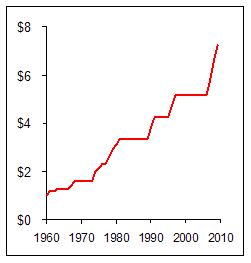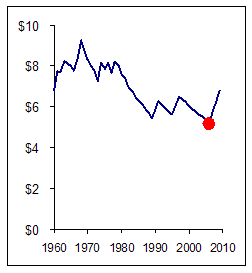It’s been mostly buried by the acrimonious debate over the Iraq War supplemental that Congress just passed, but attached to that spending bill is the first minimum wage hike since 1997. The boost to $7.25 per hour will affect about 13 million workers nationwide. President Bush has said he’ll sign it. It’s good news.
But unfortunately, Congress also missed a huge opportunity to do what Washington and Oregon have been doing for years: index the minimum wage to inflation. It’s not rocket science, but it’s surprisingly easy to forget this little verity: if your wage stays constant, but inflation occurs, you’re really and truly getting a pay cut.
To see what I mean, take a look at the history of the US minimum wage from 1960 to 2009.
Pretty sweet deal for workers, huh?
Now take a look at the same trend, with inflation factored in. [Wages are expressed in 2006 dollars; the red dot is the current wage.]
Not so groovy, is it?
The only fair remedy is to index the minimum wage to inflation. That way the lowest paid workers won’t be subjected to the fickle whims of politicians. Those whims can be tough, by the way: Congress just ended the longest stretch of not raising the wage—thereby effectively decreasing it every year—since the minimum wage was enacted in 1938.









